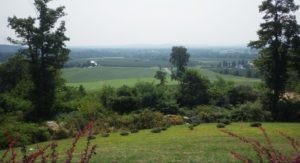This spring the Land Conservancy of Adams County partnered with the owners of the Hauser Estate Winery in Franklin Township to permanently preserve 170 acres of the vineyard as agricultural land.
The Hauser property was an exceptionally important candidate for preservation. The winery sits between Boyer Nurseries and Orchards, which was preserved by the Land Conservancy in 2014, and the Knouse Fruitlands property surrounding the Round Barn, which was preserved through the Adams County Agricultural Land Preservation Program in 2005.
“The Hauser property represented a missing link between these preserved farms, which increases its preservation value,” said Sarah Kipp, the Land Conservancy’s land conservation coordinator. “So not only are the Knouse and Boyer properties now connected, but because those two properties already adjoined preserved parcels on either side, protecting the Hauser property connects two separated clusters that now form a contiguous block of preserved land totaling about 5,000 acres.”
In addition to completing a large contiguous tract of preserved land, the Hauser property encompasses several key priorities for preservation. Its location in the South Mountain region, Marsh Creek watershed and wetlands, andthe iconic Adams County Fruit Belt all make it valuable from a preservation standpoint.
“Another important aspect of the project is that it demonstrates that land preservation is compatible with exciting changes and developments occurring in agriculture,” noted Kipp. “The terms we’re required to use by the federal grant program have been clarified, revised, and improved in the last few years; and it’s clear that this program recognizes that agricultural land preservation is not inconsistent with many kinds of commercial enterprises that farmers are exploring. Wineries, agritourism, and even cafés and shops are recognized by the Natural Resource Conservation Service as appropriate activities of protected farms.”
And according to the Hauser family, preserving the winery property also acknowledges the wishes of the family patriarch, the late John “Jack” Hauser, who served as president of the C.H. Musselman Company from 1944 to 1972. “My father was very interested in agriculture and land preservation,” said Melinda Hauser Davis, who, along with sisters Hannah Hauser and Jane Hauser Patrono, owns the winery property today. “He definitely would have been in favor of preserving this land.”
Jack’s three daughters bought the land on which the Hauser Estate Winery now sits in 1989. “The land was all apple orchards at the time,” said Davis. “We had to pull those trees down in 2000 because they were too old. We chose not to replace them, but we didn’t know what we wanted to do.”
Davis credits a Penn State University extension worker for first suggesting that the family plant a vineyard on the land. “So we hired a consultant from Virginia who specialized in vineyards,” Davis said. “She said the land had everything we wanted—the right roll to the hills, the right sun exposure, the correct air flow, and six feet of good soil for growing grapes. So we spent a year researching the idea and finally decided to go for it. We broke ground for the winery in 2007 and opened in July 2008.
“It was a given that we’d always want to see that land preserved,” Davis continued. “We made a choice when we pulled down the apple trees that we didn’t want to sell the land for development—we wanted to keep it agricultural. My dad was behind all of that—he was very much into preserving land.”
In addition to running a fruit-processing business, Jack Hauser was interested in fruit production—to the extent that he became a fruit grower himself. “My father wanted to understand what his apple growers had to deal with, so he bought 300 acres on Heckenluber Road and planted apple trees there,” explained Davis. “He planted the old-fashioned varieties—Staymans, Winesaps—not the varieties you see in the grocery store today. They don’t bring much money, but they’re the right kind for making apple ciders.”
The family still owns those 300 acres of orchard, which produce the apples that go into the Hausers’ many varieties of hard apple cider, including the popular original Jack’s Hard Cider, named for their father, who died in 1983.
Funds to complete the conservation easement were granted by the USDA’s Agricultural Conservation Easement Program, which were matched by a grant from the Adams County Commissioners as well as contributions from private donors. Completing the Hauser project brings the Land Conservancy’s total preserved acreage in Adams County to 10,150 in 150 easements.






